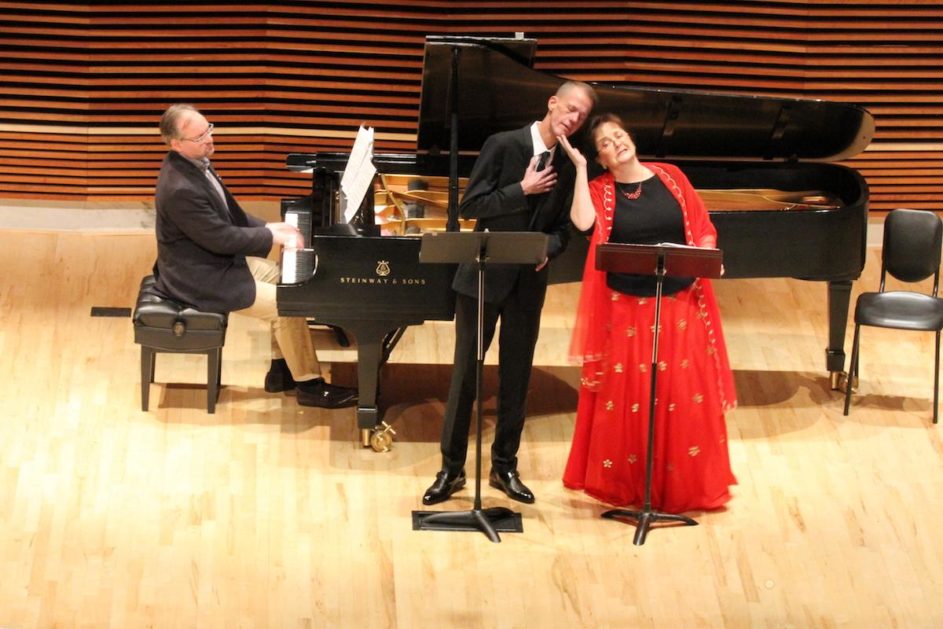A free concert featuring the chance to see mezzo-soprano Lorraine DeSimone and tenor Andrew Skoog swoon and to hear DeSimone bark and baritone Andrew Wentzel moo and quack, along with servings of classic American food, made the trip to the Sandra G. Powell Recital Hall at UT’s School of Music Sunday afternoon more than worthwhile.
It was made even more palatable by cello virtuoso Dennis Parker playing remarkable but seldom-heard solo cello music by Lukas Foss, George Rochberg and, especially, “Sonata for Solo Cello,” written in 1955 by George Crumb, a key figure in American avant-garde classical music.
This “Americana” concert was another in the School of Music’s Ready for the World Music Series. Along with a concert, classic American food of chicken casserole, dressing, sweet potatoes and pumpkin pie were served in the lobby beginning an hour or so before the music presentation began. The first concert in the series featured food and music of Puerto Rico.
These concerts are designed to be informal affairs in which the performers talk about what makes the music part of the country’s tradition and why it’s worth performing.

Dennis Parker performs George Crumb’s avant-garde “Sonata for Solo Cello.”
The program began with cellist Parker discussing Arnold Schoenberg’s invention of the 12-tone composition technique, an approach to composition in which all 12 tones in the Western chromatic scale are given equal importance and no one note is used more than any of the others.
Born in Austria, Schoenberg immigrated to the U.S. in 1934 with the rise of the Nazis, who criticized Schoenberg’s theories and music as too modernist and its atonal structure anti-patriotic to the Nazi cause.
Parker played German-American composer Foss’ 1948 composition “Capriccio for Cello and Piano” as an example of music written in the 12-tone system. He followed with a more contemporary piece, George Rochberg’s “Ricordanza for Cello and Piano,” subtitled “Soliloquy for Cello and Piano.”
Then mezzo-soprano DeSimone and pianist Kevin Class performed composer Aaron Copland’s wonderful version of the classic American hymn “At the River,” followed by Ned Rorem’s “Early in the Morning” and Stephen Sondheim’s “I Remember,” from his musical “Evening Primrose,” performed on teleision in 1966 as part of ABC’s series “Stage 67.”
But it was DiSimone’s performance of Tom Cipullo’s “Another Reason Why I Don’t Keep a Gun in the House,” a comical song about the incessant barking of his neighbor’s dog, that stuck in my memory.
That was complemented by Wentzel and Class performing Copland’s “I Bought Me a Cat,” which featured the sounds of several farm and household animals, included in Copland’s 1950 song set “Old American Songs.”

Violinist Miroslav Hristov, pianist Lina Morita and cellist Dennis Parker perform Paul Schoenfield’s “Café Music.”
Soprano Cecily Nall and pianist Judith Bible delighted with performances of three traditional American folk songs, “Sourwood Mountain,” “Black Is the Color of My True Love’s Hair” and “The Honest Miller” from composer/arranger Jack Jarrett’s “Five Appalachian Folk Songs.”
One of the highlights of the afternoon was a performance of the second movement of American composer and polymath Paul Schoenfield’s “Café Music,” with cellist Parker, UT violin professor Miroslav Hristov and pianist Lina Morita.
Music from Broadway brought the concert to a close. Irving Berlin’s “Old Fashioned Wedding” from “Annie Get Your Gun” was performed by DiSimone, Wentzel and Class. Then, DiSimone and Skoog sang Richard Rodgers and Oscar Hammerstein’s “People Will Say We’re in Love,” from the Broadway hit “Oklahoma!”
The schedule for more of the School of Music’s free concerts can be found here.

